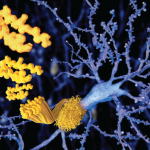
Orawan Pattarawimonchai / shutterstock.com
In the complex web of interactions between systemic inflammatory response, rheumatic disease and disease-modifying anti-rheumatic drugs (DMARDs), what is the potential for using rheumatologic therapies to treat other medical conditions linked to inflammation? Some medical researchers have looked at cardiac conditions, and others have examined the overlap with Alzheimer’s disease and other dementias.
Positive effects have resulted from using methotrexate (MTX) and other tumor necrosis factor (TNF) inhibitors to treat atherosclerosis, an inflammatory heart disease. MTX has been shown to reduce all-cause cardiovascular disease (CVD), heart failure and CVD mortality, as well as acute myocardial infarction and stroke.1 CIRT (the Cardiovascular Inflammation Reduction Trial), a randomized clinical trial funded by the National Heart, Lung, and Blood Institute to enroll 7,000 men and women in the U.S. and Canada, is testing whether low-dose MTX reduces rates of myocardial infarction, stroke and cardiovascular death. The Consortium of Rheumatology Researchers of North America’s CERTAIN (Comparative Effectiveness Registry to Study Therapies for Arthritis and Inflammatory Conditions) sub-study is an ongoing prospective cohort of adult patients with rheumatoid arthritis (RA).
Chang et al observed that the prevalence of hypertension, coronary artery disease (CAD), stroke and depression was significantly higher in the RA cohort than in a non-RA group, a finding consistent with previous studies.2 “Diabetes, hypertension, CAD, head injury, COPD [chronic obstructive pulmonary disease], stroke, CHF [congestive heart failure] and depression are also known risk factors for dementia,” they note. TNF plays a crucial role in the pathogenesis of RA. A study by Chou et al from 2016 documented an increased risk of Alzheimer’s in a studied population of patients with RA, as well as potential lower risk for those exposed to etanercept.3

Dr. Edwards
A recent observational study reported that prolonged use of non-steroidal anti-inflammatory drugs (NSAIDs) reduced the risk of dementia in patients with RA. The Baltimore Longitudinal Study of Aging also found a lower risk of Alzheimer’s disease among users of NSAIDs.4 Now, a team of researchers in the U.K. is gathering evidence of the effects of older patients receiving DMARDs for RA on the incidence of dementia.
“Dementia researchers have tried to develop treatments for Alzheimer’s disease, which by and large have not been very effective,” says one of the U.K. researchers, Christopher J. Edwards, MD, FRCP, a consultant rheumatologist and honorary chair of clinical rheumatology at University Hospital in Southampton, England. Dementia is an umbrella term for a range of conditions associated with cognitive impairment, with various hypotheses for its root causes in Alzheimer’s disease. Evidence exists that dementia is at least in part an inflammatory condition. Evidence suggesting that dementia is more common in patients with chronic inflammation like that seen in RA is not widely known among rheumatologists because they may not be looking for it, he says.
Preliminary results from the U.K. group were reported at the British Society for Rheumatology in Birmingham, U.K. in April, with a follow-up article in Alzheimer’s & Dementia.5,6 They studied incident diagnoses of RA in patients aged 18 and up from 1995–2011. At Year 5, the rate of dementia among DMARD users was 0.5%, compared with 1.6% for non-users, and at Year 15, it was half the rate of non-users. These findings offer tantalizing potential that rheumatology therapies may someday have a role in preventing or delaying the advance of dementia. However, Dr. Edwards emphasizes that this is still several years and well-funded randomized controlled trials into the future.

Prof. Holmes
Clive Holmes, PhD, a professor of biologic psychiatry at the University of Southampton, who has studied Alzheimer’s and other chronic neurologic conditions for years, including the role of the neuroinflammatory response, is part of the team working with the rheumatology researchers. In an email, he tells The Rheumatologist that the DMARD research follows a long series of studies in people with Alzheimer’s disease.
“We found that inflammation outside the brain, for example, caused by infections, tissue injury or diseases, such as RA, was associated with a marked decline in cognitive function in people with Alzheimer’s disease,” Prof. Holmes says. “We looked at a number of blood markers of this inflammation and found that TNF-alpha was most clearly associated with this decline.” Those with systemic inflammation associated with a raised peripheral pro-inflammatory cytokine signal had a more rapid long-term cognitive decline and exaggerated sickness-behavior symptoms.
“Our preliminary results support the idea that etanercept might slow Alzheimer’s disease progression,” he adds. “A recent Phase 2 study we conducted of treatment with etanercept was well tolerated in a group of patients with mild to moderate Alzheimer’s disease and had indications of beneficial effect.”7
Confounding Complications
Potentially confounding variables for these findings, which the U.K. researchers tried to overcome using propensity score matching, include age, sex, disease duration and severity, comorbidities, body mass index, alcohol and tobacco use, and use of other medications, such as steroids.
Now, contradictory findings—documenting a higher risk of dementia for patients receiving DMARDs—have been reported from Taiwan in Toxicology and Applied Pharmacology.8 The authors reviewed the literature for mechanisms of MTX-induced dementia in a logistical regression analysis of the association between use of DMARDs and risk of dementia in the Taiwanese National Health Insurance Research Database in patients aged 20 years and older newly diagnosed with RA between 2000 and 2011 (87% were aged 65 and above). They found significant association with the development of dementia, compared with patients who do not receive DMARDs.
However, the researchers draw an important distinction between conventional synthetic (cs) DMARDs, such as MTX, hydroxychloroquine and sulfasalazine, and biological DMARDs, which include etanercept, adalimumab, infliximab, certolizumab, golimumab, abatacept, rituximab and tocilizumab. The latter were not associated with a higher risk for dementia, but those receiving the csDMARDS had a 1.63-fold higher risk of dementia.
Possible mechanisms for this result may relate to folic acid depletion or altered hippocampal brain amine levels, the researchers say. “A broad-scale prospective clinical trial should be conducted to discuss how the gut–brain connection leads to dementia in patients with RA who are treated with csDMARDs.”
A number of possible explanations could exist for the different conclusions of the two studies, Dr. Edwards notes. “It could be due to differences in the design of the studies and, in particular, the case-control study design they use vs. our work that uses a prospective cohort study approach.” Differences in biology could exist in different populations around the world. “That would be fascinating and could lead to a better understanding of how dementia develops,” he adds. “Trying to explain differences is always good for the science.”
Evidence exists that dementia is at least in part an inflammatory condition.
Dementia Implicates Inflammation
“We know some dementia is vascular and likely to be aggravated by inflammation,” Dr. Edwards says. “We also know we have these powerful and potent rheumatologic medications that target inflammation. When you see that methotrexate lowers the risk of cardiac disease, it makes sense to ask what other things it might help. If inflammation is important for these other conditions in the general population, we know it will happen faster in patients with RA, providing fertile ground for testing what’s going on,” he says.
“There’s a lot of evidence to suggest that chronic inflammation is bad for us in many parts of our body. Part of this is a consequence of living longer, but the key for researchers is to find a way to switch it off,” Dr. Edwards says. “It’s too soon to know what, exactly, methotrexate is doing in this context. There are so many variables. The lowered dementia risk we found may be the result of less vascular disease in RA, mediated through its reduction of inflammation. What makes me hopeful is that the story just makes sense, based on the cardiac model. The background is so strong. Now it’s time to collect more data with bigger, Phase 3 studies.”
The strong effect of csDMARD use found by the U.K. researchers, halving the dementia risk, requires replication in randomized clinical trials to validate csDMARDs as a possible therapeutic pharmacological treatment for dementia. Developing new immunotherapies is always a resource-intensive activity, Dr. Edwards says. “When I talk with my patients these days about the pros and cons of treatment, I mention the evidence from the cardiovascular research and say it may have protective effects from inflammation elsewhere in the body.”
The U.K. group, along with colleagues at Queens University Belfast, has received grant support from the U.K. Alzheimer’s Society for RESIST (Rheumatoid Arthritis Medication And Memory Study), a trial to look at cognitive function in elderly RA patients with mild cognitive impairment and the effects of DMARDs and TNF inhibitors over three years. “The promise is that we may get independent verification that we may have a new treatment for slowing down Alzheimer’s disease progression and, potentially, preventing the disease in a good proportion of patients,” Prof. Holmes adds.
Larry Beresford is a freelance medical journalist in Oakland, Calif.
References
- Marks JL, Edwards CJ. Protective effect of methotrexate in patients with rheumatoid arthritis and cardiovascular comorbidities. Ther Adv Musculoskelet Dis. 2012 Jun;4(3):149–157.
- Chang KH, Hsu YC, Hsu CC, et al. Prolong exposure of NSAID in patients with RA will decrease the risk of dementia: A nationwide population-based cohort study. Medicine (Baltimore). 2016 Mar;95(10):e3056.
- Chou RC, Kane M, Ghimire S, et al. Treatment for rheumatoid arthritis and risk of Alzheimer’s disease: A nested case-control analysis. CNS Drugs. 2016 Nov;30(11):1111–1120.
- Waldstein SR, Wendell CR, Seliger SL, et al. NSAIDs, aspirin, and cognitive function in the Baltimore longitudinal study of aging. J Am Geriatr Soc. 2010 Jan;58(1):38–43.
- Judge A, Prieto-Alhambra D, Arden NK, et al. The effects of disease modifying anti-rheumatic drugs on dementia in patients with rheumatoid arthritis: A population-based propensity-matched cohort study over 15 years [abstract 151]. Rheumatology (Oxford). 2017 Apr;56(suppl 2).
- Judge A, Garriga C, Arden NK, et al. Protective effect of antirheumatic drugs on dementia in rheumatoid arthritis patients. Alzheimers Dement (N Y). 2017 Nov; 3(4):612–621.
- Butchart J, Brook L, Hopkins V, et al. Etanercept in Alzheimer’s disease: A randomized, placebo-controlled, double-blind, phase 2 trial. Neurology. 2015 May 26;84(21):2161–2168.
- Chou MH, Wang JY, Lin CL, Chung WS. DMARD use is associated with a higher risk of dementia in patients with rheumatoid arthritis: A propensity score-matched case-control study. Toxicol Appl Pharmacol. 2017 Nov 1;334:217–222.

